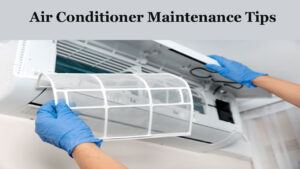An air conditioner is necessary to keep our homes comfortable and cool during the hottest times of the year. It works by eliminating heat and moisture from the air inside your house and replacing it with cool air. There are various kinds of air conditioners, such as central air conditioning structures, room units, and portable units, each with its own advantages and disadvantages.
Regardless of the type of air conditioning system you have, appropriate maintenance is essential to ensure that it runs efficiently and lasts for many years. In addition, proper maintenance and usage practices allow you to maximize your air conditioner’s effectiveness and experience a cool, relaxing home throughout the summer.
Heat tiredness, severe heatstroke, and other heat-related illnesses can occur in high temperatures, particularly in vulnerable groups such as seniors, kids, and people with specific medical conditions. An air conditioner aids in regulating the humidity and temperature in our homes, lowering the danger of these health issues. Additionally, by filtering toxins, allergens, and other pollutants, air conditioning units can contribute to improving indoor air quality. This is particularly advantageous for those who have allergies or respiratory issues.
Benefits of having an air conditioner:
- Improved Comfort: The main advantage of having an air conditioner is that it provides more comfort within humid and hot conditions. It contributes to maintaining suitable domestic temperatures, lowering the risk of heatstroke and other weather-related diseases.
- Better interior Air Quality: By filtering pollutants, allergens, and other irritants, air conditioning units can help enhance interior air quality. People who suffer from allergies or breathing issues may find this especially beneficial.
- Increased Productivity: A pleasant and cool residential atmosphere can help increase productivity by decreasing tiredness and increasing mental alertness.
- Humidity Reduction: Air conditioners help decrease the amount of humidity, which can lead to mould and mildew development, offensive smells, and harm to furnishings as well as other household items.
- Better Sleep: A pleasant and cool bedroom environment can promote better sleep, which leads to better general health and well-being.
- Lowers the risk of electrical damage: High humidity and temperature levels can harm electronics like computers, TVs, and other electrical gadgets. Air conditioners aid in regulating residential humidity and temperature levels, lowering the risk of gadget damage.
- Increased Security: Because air conditioners enable you to maintain your windows and doors shut down, you have more protection against attackers and other outside forces.
- Energy Efficiency: Contemporary air conditioners are energy-efficient, saving money on utility bills while keeping your house cool and comfortable.
- Increased Comfort: The main advantage of using an air conditioner is increased comfort in humid and hot conditions. It contributes to maintaining a comfortable indoor temperature, lowering the risk of heatstroke and other heat-related diseases.
Here are some tips for increasing the efficiency of your air conditioner during the summer:
- Replace or clean air filters: Dirty filters can reduce ventilation in your AC system, causing it to function tougher to cool your house. To maintain your air conditioner running efficiently, regularly replace or clean the air filters.
- Maintain a consistent thermostat temperature: Set the thermostat to an appropriate temperature and maintain it. Changing the temperature frequently can cause your air conditioner to work harder than required, resulting in higher energy bills.
- Keep the windows and doors closed: Keep doors and frames closed while your air conditioner operates to avoid warm air invading the room and forcing the air conditioner to work harder.
- Use ceiling fans: Ceiling fans can help circulate cool air throughout the room, reducing the load on your AC. To maximise energy efficiency, use them in conjunction with your air conditioner.
- Schedule regular maintenance: A professional can help identify potential issues and ensure that your AC is running at peak efficiency.
- Consider upgrading to a more efficient unit: If your AC is old and inefficient, upgrading to a newer, more efficient model can significantly reduce your energy bills while keeping your home comfortable during summer.
The Different Types of Air Conditioners:
- Central Air Conditioning: Central air conditioning is a system that uses a network of ducts to distribute cool air throughout your home.For cooling large homes or buildings, it is often the most expensive form of air conditioning system, but it is also the most effective.
- Window Air Conditioning: Window conditioning devices are independent systems that are placed in an open window or building opening. They are less costly than centralized air conditioning systems and are an excellent choice for cooling separate rooms or smaller spaces.
- Portable Air Conditioning: Movable cooling devices, like window units, can be moved from room to room. They are an excellent choice for renters or houses that cannot fit a window unit.
- Split air conditioners: Split air conditioners comprise an indoor device and a unit outside. The indoor unit is wall-mounted and linked to the outdoor device by a refrigerant line. They are an excellent choice for cooling individual rooms or spaces and are usually more energy-efficient than window units.
- Ductless Air Conditioning: Ductless air conditioning systems are identical to split systems in that they distribute cool air without the use of ductwork. They are an excellent choice for older houses or those without existing ductwork.
- Geothermal Air Conditioner: Geothermal air conditioning systems cool and heat your house by utilizing the earth’s natural heat. They are the most environmentally friendly and energy-efficient option, but they are also more expensive to install than other kinds of air conditioning systems.
Conclusion
Finally, air conditioning systems provide numerous advantages, including increased comfort, improved air purity, increased productivity, reduced humidity, and improved sleep. They can also help to extend the life of furniture and appliances, reduce insect and pest infestations, and increase the value of a house. It’s also worth noting how you use your air conditioner can help it run more efficiently. Maintaining a reasonable temperature, such as around 78 degrees Fahrenheit, can help decrease the workload on your air conditioner. Close your blinds and curtains during the hottest portions of the day to keep the sun’s heat out. Also, if feasible, avoid using warm-generating machines during the hottest parts of the day, as they can make the air conditioner work harder. You can guarantee optimal performance and savings on electricity during the summer months by using your air conditioner wisely and following the maintenance and operation tips.
The size of the unit is another essential factor in air conditioner efficiency. Selecting an air conditioner that is the correct capacity for your space is critical. The space will need to be cooled more effectively if the unit is too small, which will increase energy use and costs. If the unit is smaller, it may frequently cycle intermittently, decreasing efficiency and higher energy costs. As a result, it’s critical to consult with an expert HVAC technician to determine the right size unit for your specific requirements. By selecting the appropriate size air conditioner, you will maximize its efficiency while lowering your electrical use and expenses.


